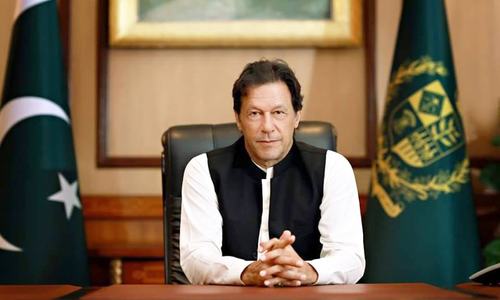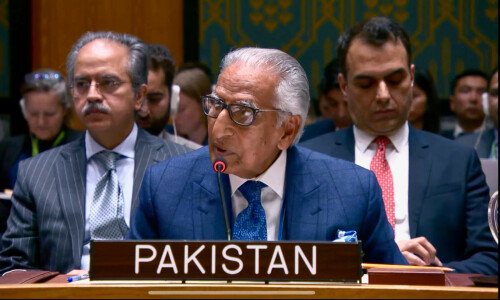
GEERT Wilders, the fiercely anti-Islam Dutch politician, has got what he wanted: his decision to hold a controversial cartoon competition on his party’s private premises in the Dutch Parliament in November this year means he’s back in the headlines, the centre of national and international attention.
What more could a Far Right European politician, whose star hasn’t been shining too brightly in recent months, ask for?
Not much. But in fact he is getting much more. For Wilders, who has already been found guilty of inciting hatred and lives under a round-the-clock guard following years of death threats, the competition kills many birds with one stone.
First, it gets Wilders noticed — once again — on a very crowded stage. His Freedom Party, along with France’s Front National (now the National Rally) led by Marine Le Pen, used to dominate the landscape with its regular and outrageous Islamophobic diatribes.
The two were constantly in the headlines as the Netherlands and France went to the polls last year. The national and international media showered both with an inordinate amount of attention, predicting they would capture the national vote and turn politics at home and in Europe on its head.
It did not happen. Mark Rutte’s centre-right VVD party, in part by leaning more to the right and taking up the issue of migration, came out first in the polls, with Wilders trailing behind. Cobbling together the current ruling coalition — which excludes the Freedom Party — took several months.
Read: Dutch premier distances govt from anti-Islam cartoon contest
In France, Le Pen was unceremoniously seen off by Emmanuel Macron whose victory illustrated the power of a political narrative based on hope, not hate.
To make things worse, Wilders is no longer the only Far Right celebrity and media darling around. Yesterday, he loomed large. Today, at home, Wilders is overshadowed by the likes of the young, colourful and much slicker Thierry Baudet, who heads the alt-right Forum for Democracy and is now more often in the news.
According to one Dutch commentator, Baudet “normalises the racist and dangerous discourse which he implicitly affiliates himself with under the guise of irony and humour”. The latter two personality traits aren’t often associated with Wilders.
Also in the running to be become Europe’s toughest anti-Muslim politician is Hungarian Prime Minister Viktor Orban who uses even more colourful and offensive language in his comments on Islam and Muslims than Wilders. Orban and Matteo Salvini, the leader of the Italian Far Right Lega Nord and interior minister in the current Italian government, are crafting what they proudly proclaim will be a Europe-wide anti-immigration alliance.
In Austria, the xenophobic Far Right is in government. The Far Right Alternative for Germany (AfD) party is in the German parliament for the first time. And the upcoming Swedish elections are likely to see a strong performance by the Far Right and anti-Islam Sweden Democrats.
Meanwhile, US President Donald Trump’s former aide Steve Bannon is setting up shop in Europe with his Far Right “Movement” Foundation. While initially intrigued and flattered by Bannon’s interest in them, Europe’s Far Right leaders now fear being upstaged by the American.
Second, as he struggles to keep up his bad boy image, Wilders wins important political points at home by embarrassing Prime Minister Mark Rutte on the global stage.
Clearly uneasy under the Muslim spotlight, Rutte and his ministers are trying hard to make clear that Wilders is not a member of the government, that his competition is “provocative” and “not respectful” and that it’s hardly likely to result in a thoughtful debate on Islam.
They are right of course. The government can’t dictate to the Dutch Parliament. But delighted at having wrong-footed his opponents, Wilders has, in turn, accused Rutte and his government of being “Islam-cuddlers” who pander to Muslims.
Third, while Wilder and other European Muslim-baiters win, Muslims lose. The competition makes life difficult for Dutch — and European — Muslims who just want to be left alone to get on with their lives as tax-paying, law-abiding and productive European citizens.
Instead, as underlined by anti-racist and human rights organisations, European Muslims continue to face prejudice and discrimination. Wilders is making sure the harassment continues.
Finally, the furore provoked by the competition in Pakistan, including the Tehreek-i-Labbaik protest march, demands that Imran Khan’s new government sever diplomatic ties with the Netherlands and Prime Minister Khan’s promise to take up the issue at the United Nations later this month, serves to reinforce clichés of Muslims as intolerant.
For Wilders, the controversy — and signs that the rage could spill over from Pakistan to other Muslim countries — is just what the doctor ordered. He gets to be centre stage, play the victim and reclaim his title as Europe’s fiercest anti-Muslim hater.
For the rest of us, it’s back to the future as claims of a clash of civilisations between Islam and the West, boycotts, protests and accusations of blasphemy versus freedom of expression are revived and extremists on all sides dominate the agenda.
Responsible Pakistani and Dutch politicians and diplomats must act swiftly to de-escalate mounting tensions. For Pakistan’s new government this is an important opportunity to spotlight its diplomatic credentials and its ability to manage religious extremism.
The stakes are high. A European populist’s dream must not be allowed to become everyone else’s nightmare.
—The writer is Dawn’s correspondent in Brussels
Published in Dawn, August 31st, 2018

















































